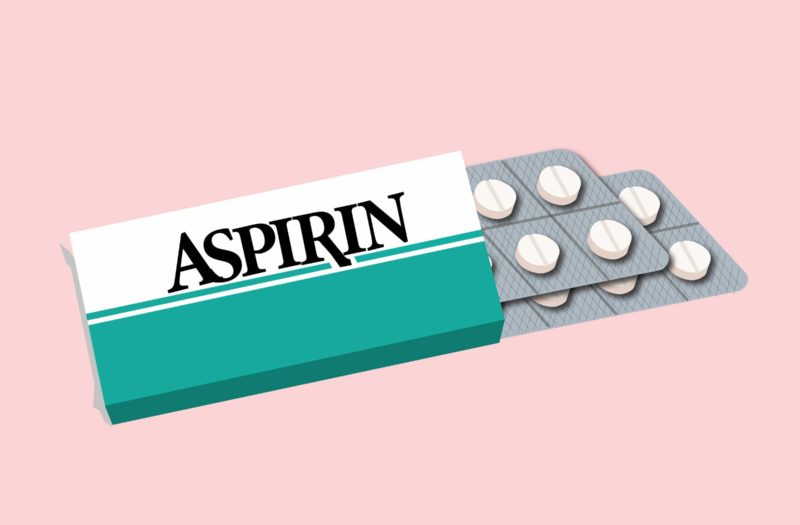New research shows that healthy people who use aspirin regularly to prevent cardiovascular disease are less likely to get infected with COVID-19 than those who do not use aspirin.
In a March 2021 study published in the FEBS Journal, researchers observed how low-dose aspirin (75 milligrams) affects COVID-19 susceptibility and disease duration. They hypothesized that aspirin would decrease the chances of getting sick with coronavirus, considering aspirin has anti-inflammatory effects and may help modulate immune responses that allow your body to battle certain viral infections.
The researchers analyzed data of 10,477 people who were tested for COVID-19 from February 1, 2020 to June 30, 2020 — 662 of which tested positive for COVID-19. Of those who tested positive, 11 percent were aspirin users. Patients who used aspirin use for “secondary prevention” (say, individuals who had already been diagnosed with coronary artery disease) or for other conditions were not observed for the study.
The researchers found that people who regularly used aspirin to prevent heart disease had a 29 percent lower chance of getting infected with COVID-19 than people who did not. And for the aspirin users who did get COVID-19, their disease duration was two to three days shorter than non-aspirin users who lacked pre-existing conditions that extended the disease duration, like diabetes.
“The exact aspirin action mechanism for COVID-19 is still under investigation, but aspirin is an anti-inflammation treatment used to treat Kawasaki disease [inflammation of the blood vessels], pericarditis [the swelling and irritation of a membrane around the heart], rheumatic fever [a condition that occurs when strep throat or scarlet fever aren’t properly treated] and thrombosis [blood clot],” says Milana Frenkel-Morgenstern, PhD, one of the authors of the study. “COVID-19 is known for causing problems with blood clots and inflammation.”
She adds that this study showed that “aspirin reduces the likelihood of COVID-19 infection, reduces the disease duration, and reduces chances of long COVID-19,” noting that aspirin may also lower the likelihood of severe COVID-19 by decreasing fever, inflammation, and blood complications.
Recent studies have shown low-dose aspirin is not linked to significant differences in primary cardiovascular disease prevention, and the American College of Cardiology and the American Heart Association now discourage the routine use of aspirin — especially in patients who have an increased risk of bleeding. Many people, however, still do receive low-dose aspirin as a preventive measure, note the study authors.
One major limitation in this study was the lack of control in treatments given to patients, which may have affected outcomes. The researchers did, however, adjust for factors such as sex, age, smoking status, socioeconomic status, lab data, and comorbidities to show that the results depended only on aspirin use.
More research is needed to determine if aspirin could serve as a prevention tool in the fight against COVID-19.
“Our data on the possible use of low-doses of aspirin for the prevention of COVID-19 infection are preliminary, yet intriguing,” note the researchers in their study. “We thus need prompt clinical consideration of this safe, low-cost drug with the potential to favorably alter COVID-19 infection outcome.”
In the meantime, you shouldn’t start taking aspirin regularly unless your doctor recommends it for your condition. Aspirin use skyrocketed during the 1918 to 1919 influenza pandemic, but its misuse may have played a role in the high death toll due to toxicity and a risky build-up of fluid in the lungs, per an article in the journal Clinical Infectious Diseases.
Although the results of this research are fascinating and pave the way for more studies on this topic, the best ways to avoid getting sick with COVID-19 are still to get the vaccine, wear a mask, practice social distancing, and wash your hands frequently.
Get Free Coronavirus Support for Chronic Illness Patients
Join the Global Healthy Living Foundation’s free COVID-19 Support Program for chronic illness patients and their families. We will be providing updated information, community support, and other resources tailored specifically to your health and safety. Join now.
Interview with Milana Frenkel-Morgenstern, PhD. Principal Investigator at Frenkel-Morgenstern Lab, Israel.
Lin K, et al. Rethinking Aspirin for the Primary Prevention of Cardiovascular Disease. American Family Physician. June 1, 2019. doi: https://doi.org10.12788/jfp.0092.
Merzon E, et al. The use of aspirin for primary prevention of cardiovascular disease is associated with a lower likelihood of COVID‐19 infection. The FEBS Journal. February 23, 2021. doi: https://doi.org/10.1111/febs.15784.
Starko K. Salicylates and Pandemic Influenza Mortality, 1918–1919 Pharmacology, Pathology, and Historic Evidence. Clinical Infectious Diseases. November 15, 2009. doi: https://doi.org/10.1086/606060.






